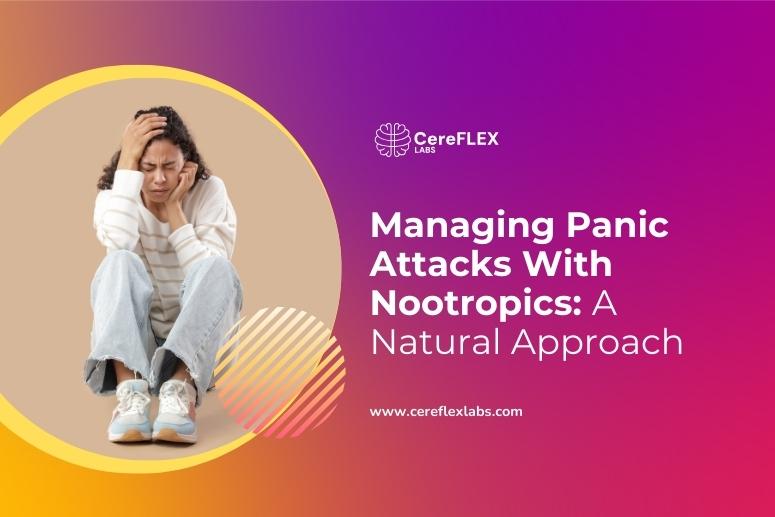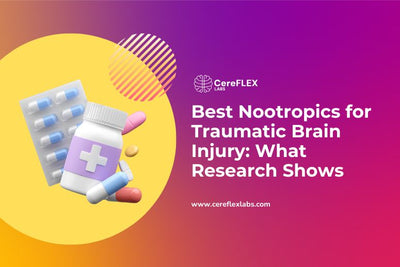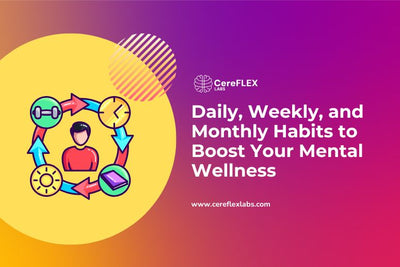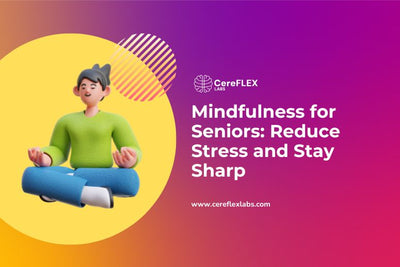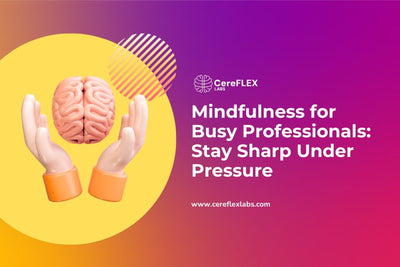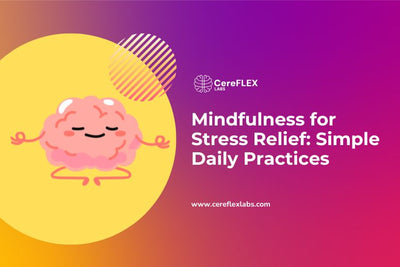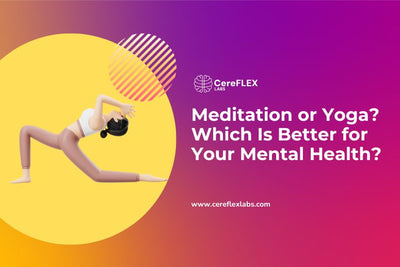Your heart pounds, your chest tightens, and a sudden wave of fear overwhelms you. If you’ve ever experienced a panic attack, you know how intense and debilitating it can be.
In moments like these, many people seek natural solutions to ease their symptoms. Some turn to nootropics that prevent panic attacks and anxiety, hoping for relief. While these brain-boosting supplements are known for improving cognitive function, can they also help reduce anxiety and panic symptoms?
Certain nootropics, like L-Theanine, Rhodiola Rosea, and Bacopa monnieri, have been shown to support emotional stability and stress resilience. By gently influencing brain chemistry, they may help lessen the intensity of panic attacks and improve the body's ability to manage stress over time.
Understanding how these natural compounds work could offer a new path toward anxiety management—one that aligns with the body’s innate ability to restore balance and heal.

What are panic attacks?
A panic attack is a sudden, intense wave of fear or discomfort that peaks within minutes. Unlike general anxiety, which builds gradually and often has a clear cause, panic attacks strike suddenly and can feel overwhelming. Their physical symptoms—such as a racing heart and chest pain—are so severe that many mistake them for heart attacks, often leading to emergency room visits.
Common Symptoms
Panic attacks involve both physical and psychological symptoms, making them distressing and unpredictable.
Physical Symptoms:
- Rapid or pounding heartbeat
- Shortness of breath
- Chest pain or tightness
- Dizziness or lightheadedness
- Sweating, chills, or hot flashes
- Shaking or trembling
- Nausea or stomach discomfort
- Numbness or tingling sensations
Psychological Symptoms:
- Overwhelming fear of losing control or "going crazy"
- Feeling detached from reality (derealization) or oneself (depersonalization)
- Fear of dying or impending doom
Panic attacks trigger the body’s fight-or-flight response, meaning they can occur even in non-threatening situations, making them challenging to manage.
Common Triggers
While panic attacks can seem unpredictable, they often stem from specific triggers, including:
-
Stress and Anxiety: Chronic stress and anxiety disorders can sensitize the nervous system, increasing attack frequency.
-
Stimulants: Caffeine, nicotine, and certain medications can overstimulate the nervous system, heightening anxiety.
-
Trauma and PTSD: Past traumatic experiences can contribute to panic attacks.
-
Medical Conditions: Hyperthyroidism, heart arrhythmias, and low blood sugar can mimic panic attack symptoms.
-
Substance Withdrawal: Stopping alcohol or certain medications suddenly can trigger withdrawal-related panic attacks.
Understanding your personal triggers is essential for managing and preventing future attacks.
Impact on Daily Life
Frequent panic attacks can disrupt mood stabilization and lead to chronic anxiety and emotional instability. Their impact extends beyond the moment, affecting daily life in significant ways:
- Reduced Quality of Life: Fear of an attack may cause people to avoid social activities and miss out on enjoyable experiences.
- Work and Academic Struggles: Anxiety can result in difficulty concentrating, missed deadlines, and frequent absences.
- Strained Relationships: Friends and family may struggle to understand panic attacks, leading to frustration and isolation.
- Agoraphobia: In severe cases, individuals may develop a fear of leaving safe spaces, limiting their independence and mobility.
Because panic attacks are unpredictable and overwhelming, managing them is crucial for long-term mental health and well-being. While therapy, breathing exercises, and medication are traditional approaches, many people are also exploring natural alternatives—such as nootropics—for their potential to reduce stress and support the nervous system.
What are the best supplements for anxiety and panic attacks?
Some nootropics can help you relax, manage stress, and reduce the frequency and intensity of panic attacks. Unlike traditional anti-anxiety medications, these natural compounds support brain function and help the body adapt to stress without causing drowsiness or dependency.
Let’s explore some of the most effective plant-based supplements that uplift your mood and promote emotional well-being:

L-Theanine
L-Theanine, an amino acid found in tea, is widely recognized for its calming effects. It helps reduce anxiety and stress1 by promoting alpha brain wave activity, which induces a relaxed yet alert state.
Additionally, L-Theanine boosts GABA levels, calming overactive neurons and reducing feelings of nervousness and panic.
Typically found in green and black tea, the standard supplement dosage is 200-400 mg per day, taken for 4-8 weeks.
Consult a healthcare provider for personalized recommendations.
Rhodiola Rosea
Nicknamed “golden root,” Rhodiola Rosea is a powerful adaptogen that helps the body resist stress and recover from anxiety-related fatigue.
It has been traditionally used to enhance nervous system function, combat burnout, and stabilize mood disorders. Studies suggest it may also improve cognitive function, memory, and physical endurance.
Some research highlights its potential cardiovascular and reproductive health benefits due to its ability to reduce stress-related damage.2
The standard supplement dosage is 100-600 mg per day, taken for up to 12 weeks.
Consult a healthcare provider before starting.
Bacopa Monnieri
Bacopa monnieri is an herbal remedy that has been used for centuries in Ayurvedic medicine to enhance mental clarity and relieve stress.
This powerful adaptogen increases GABA production, which helps calm the nervous system and reduce anxiety symptoms. Additionally, it supports memory, focus, and nerve protection.
A human study found that taking 500 mg of Bacopa monnieri twice daily for 4 weeks significantly reduced depression, anxiety, and stress.3
The standard supplement dosage is 300-600 mg per day, taken for 12 weeks.
Consult a healthcare provider for the best dosage based on individual needs.
Ashwagandha
Ashwagandha is a well-known stress-relief herb in Ayurvedic medicine. Research suggests that withanolides—the active compounds in its roots—help regulate the body’s stress response and reduce cortisol levels.4
Beyond anxiety relief, Ashwagandha is known for:
- Reducing fatigue
- Enhancing sleep quality
- Boosting overall resilience to stress
However, Ashwagandha may cause hormone-related side effects, particularly in men. Always consult a healthcare professional before use.
The standard supplement dosage is up to 1000 mg per day, taken for up to 12 weeks.

Ginkgo Biloba
Ginkgo Biloba is an ancient Chinese herbal remedy that has been used for centuries to support brain health and stress resilience.
It helps:
- Manage short-term stress
- Support new brain cell growth
- Ease anxiety linked to stress
A 2007 study found that people taking Ginkgo experienced lower anxiety levels compared to those taking a placebo, highlighting its potential as a natural anti-anxiety aid.
The standard supplement dosage is 60-240 mg per day, taken for up to 6 months.
Dosage may vary depending on specific formulations.
General Safety Profile of Nootropics
Many nootropics for panic attacks, such as L-Theanine, Rhodiola Rosea, and Bacopa monnieri, come from natural sources and have been used for centuries in traditional medicine.
These supplements offer several advantages over conventional anti-anxiety medications:
✔ Non-sedative – They promote relaxation without causing drowsiness or mental fog.
✔ Non-addictive – Unlike benzodiazepines, nootropics do not lead to dependence or withdrawal symptoms.
✔ Cognitive support – Many also help enhance brain function, protect neurons, and support long-term mental health.
However, natural does not always mean risk-free. It’s essential to be aware of:
-
Potential Side Effects – Some nootropics may cause mild issues like headaches, nausea, or digestive discomfort.
-
Drug Interactions – Certain nootropics may interact with prescription medications, including antidepressants, blood thinners, or stimulants.
-
Personal Sensitivities – Individuals may react differently based on genetics, health conditions, or existing medications.
Always consult a healthcare provider before starting a new supplement, especially if you have pre-existing health conditions or take medications.
Side-effects of Nootropics
While many nootropics are generally well-tolerated in small doses, they are not completely risk-free. Some can cause side effects, especially when combined with medications or used in high doses.
Additionally, most nootropics are not strictly regulated, meaning their long-term effects remain uncertain. People react differently based on factors like genetics, pre-existing conditions, and dosage levels.
When taking nootropics, you may experience:
- Headaches
- Increased anxiety or restlessness
- Stomach discomfort or nausea
- Difficulty sleeping (insomnia)
- Rapid or irregular heartbeat
- Potential habit-forming tendencies (though not as addictive as prescription drugs)
Avoid nootropics or consult a doctor if you:
- Have a history of stroke, heart conditions, or high blood pressure.
- Take blood thinners, antidepressants, or stimulants, as nootropics may interact with these medications.
- Have mental health conditions such as bipolar disorder or schizophrenia, as some nootropics may worsen symptoms.
- Have a history of substance abuse, as certain nootropics may alter brain chemistry in unpredictable ways.
The Risks of Stacking Nootropics
"Stacking" refers to combining multiple nootropics to enhance effects. While this approach is popular, it also increases the risk of side effects and potential drug interactions. If you’re considering stacking nootropics, consult a healthcare provider to ensure safe use.
How Cereflex Labs’ AM/PM Brain Formulas Can Help
Cereflex Labs’ AM/PM Brain Formulas are designed to support cognitive health and emotional well-being. This two-part supplement works with your body's natural rhythms, promoting mental clarity, resilience, and relaxation throughout the day.
The AM formula is crafted to kickstart your day with enhanced focus, memory, and mental energy. It helps:
✔ Improve cognitive function for better clarity and decision-making.
✔ Enhance memory and mental performance to support daily tasks.
✔ Boost blood circulation to the brain, improving oxygen and nutrient delivery.
The PM formula is specifically designed to help you reclaim restful nights and calm sleep, supporting brain during daily stress. It works by:
✔ Providing antioxidants to combat oxidative stress and protect brain cells.
✔ Supporting the body’s peripheral circulatory system, which plays a role in overall health.
✔ Delivering essential vitamins and minerals to nourish brain function while you sleep.
By addressing both daytime mental performance and nighttime recovery, Cereflex Labs’ AM/PM Protocol provides a comprehensive approach to cognitive well being.
Conclusion
Panic attacks can be overwhelming, but specific nootropics can help the brain better regulate stress and emotions. Ingredients like L-Theanine, Rhodiola Rosea, and Bacopa monnieri support healthy brain chemistry, lower cortisol levels, and enhance cognitive function, all of which are crucial for reducing anxiety and panic symptoms.
However, nootropics work best when combined with mindfulness practices, healthy lifestyle habits, and professional guidance when needed. Consistency is key—incorporating these supplements into your daily routine can significantly improve mental resilience and overall well-being.
For a science-backed approach to stress and cognitive health, Cereflex Labs’ AM/PM Protocol provides targeted support throughout the day and night. Their carefully selected ingredients complement the benefits of nootropics, helping you achieve mental clarity, focus, and emotional stability.
Take control of your mental health today with Cereflex Labs’ AM/PM Protocol—a natural, structured way to manage stress and support brain function. Start building a calmer, stronger mind today.
